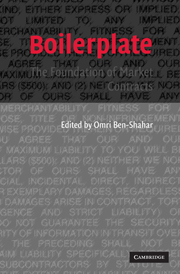Book contents
- Frontmatter
- Contents
- Preface
- List of Contributors
- PART ONE WHY IS BOILERPLATE ONE-SIDED?
- PART TWO SHOULD BOILERPLATE BE REGULATED?
- PART THREE INTERPRETATION OF BOILERPLATE
- 11 Contract as Statute
- 12 Modularity in Contracts: Boilerplate and Information Flow
- 13 Contra Proferentem: The Allure of Ambiguous Boilerplate
- PART FOUR COMMENTARY
- Notes
- Index
12 - Modularity in Contracts: Boilerplate and Information Flow
Published online by Cambridge University Press: 02 December 2009
- Frontmatter
- Contents
- Preface
- List of Contributors
- PART ONE WHY IS BOILERPLATE ONE-SIDED?
- PART TWO SHOULD BOILERPLATE BE REGULATED?
- PART THREE INTERPRETATION OF BOILERPLATE
- 11 Contract as Statute
- 12 Modularity in Contracts: Boilerplate and Information Flow
- 13 Contra Proferentem: The Allure of Ambiguous Boilerplate
- PART FOUR COMMENTARY
- Notes
- Index
Summary
Editor's Note:In this chapter, Henry E. Smith explores the modularity aspects of boilerplate — how a standard term can be used in many different contracts, plugged in or out without having to modify other aspects of the contract. Smith finds that the modularity property arises from what he calls the “extensiveness” of the information contained in the term, being less context dependent and less informative, thus applicable in more settings. Whereas property rights are the ultimate extensive provisions – having identical structure over all circumstances and incorporating very little ad-hoc information – tailored contracts are at the other extreme, applicable to a single setting and incorporating a great deal of ad-hoc contexts. Within these polar types, boilerplate is intermediate, sharing many of the extensiveness attributes of property rights.
Contractual boilerplate is a little like property. Such a statement might seem like a category mistake. After all, contractual boilerplate language is part of contracts, which, unlike property, are freely customizable by the parties. Contracts create rights between those parties, not against the world at large. Nor do people who devise new boilerplate terms usually have intellectual property in the provisions themselves.
But in an interesting and overlooked way, boilerplate is the first way station on the road from contract to property. In particular, boilerplate, like all legal communication, is the result of striking a trade-off between communicating intensively in a narrow sphere or communicating in a more stripped-down, formal way in a wider variety of contexts.
- Type
- Chapter
- Information
- BoilerplateThe Foundation of Market Contracts, pp. 163 - 175Publisher: Cambridge University PressPrint publication year: 2007
- 9
- Cited by



